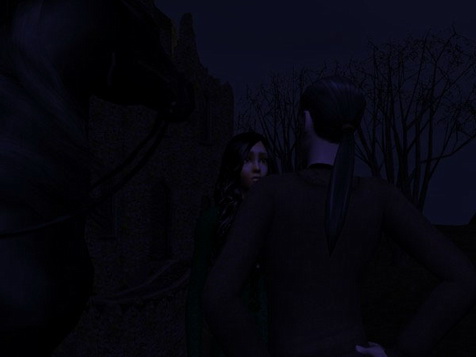
There was no “What is this place, Cian?” – no more than there had been a “Where are you taking me, Cian?” – no more than a “How far is it to ride?” Eithne would have followed him up to the gate of what she thought Hell to be, and she would have followed him inside. But not for love.
“Won’t you look, Eithne?” he asked coldly. “You may call it your first home.”
Dutifully she turned to look. Her unquestioning obedience he had.

“I suppose it is mine now,” he muttered. “The man for whom I built it will never more enter it. If it still had a door I would give you the key, little mistress.”
“You built it?” Eithne’s voice rose slightly at the end of the phrase, as voices ought when they asked a question – but this was the closest thing to real interest or emotion he had heard from her since they had fled.
Sweetdew was so surprised and heartened she immediately yowled, “Just what we would expect of him! A pile of rubble with broken bits sticking out everywhere. You make castles like you make sandwiches, temanyeh.”

Though Sweetdew tried and tried to joke and tease, Dantalion no longer translated for her. He would not have Eithne laughing for Sweetdew if she would not even smile for him. And Eithne no longer presumed to ask.
“I built this castle when your Saint Columba was still trying to convince your shaggy ancestors there were such beings as angels at all.”
It was the first time he had pronounced the word “angel” since she had stopped speaking it. He waited to see what she would say.
She said nothing. Already the life he had seen in her a moment before was dying out of her eyes.

His fear and frustration tore out of him in a snarl. “And I cursed every stone as I laid it!” he shouted over her head at the ruin.
The ruin and the high-walled valley echoed it back, but Eithne did not flinch. If he had shouted it into her face he thought she would not have flinched. If he had cursed her very name she would not have flinched.
He thought he could have dragged her up to the crumbling wall and slowly stoned her to death with the cursed bricks that had already fallen, and she would not have flinched.
It was fortunate he believed she would not. If he had not, he might have tried.







Poor Eithne. She's so damaged. And those last couple of lines made me worry...